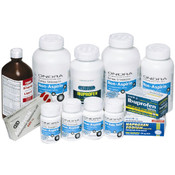Statin should not be considered for patients with heart failure (HF) of non-ischemic etiology, because lipid (cholesterol) lowering drugs do not translate into any clinically meaningful benefit for patients with heart failure (HF).
This is one of the unexpected outcomes from a large scale Italian study (Gruppo Italiano per lo Studio della Sopravvivenza nell'Infarto Miocardico Heart Failure or GISSI-HF study) involving 6,975 patients with New York Heart Association (NYHA) class II-IV HF of any cause and with any left ventricular ejection fraction who were randomized to receive daily supplementation of omega-3 fatty acids 1 g (805-882 mg eicosapentaenoic acid and docosahexaenoic acid in the average ratio 1:1.2) or placebo. In addition, 4,574 patients of the same group were also randomized to receive Crestor, (rosuvastatin calcium, 10 mg daily, Astra Zeneca) or placebo.
Trial design
The GISSI-HF trial was designed to investigate the effects of omega-3 fatty acids and statin therapy on mortality and morbidity in patients with chronic heart failure (HF).
Trial results
The results of this trial were presented by dr Luigi Tavazzi of the Fondazione Policlinico San Matteo, Pavia in Italy during the European Society of Cardiology (ESC) Congress 2008 in Munich, Germany and simultaneously published in The Lancet (1, 2)
Based on the results of the GISSI-HF study, the investigators concluded that the prescription of Crestor, which is indicated to reduce elevated total cholesterol, LDL-C, ApoB, non-HDL-C and triglyceride levels and to increase HDL-C in patients with primary hyperlipidemia and mixed dyslipidemia, or any statin to patients with heart failure (HF) of non-ischemic etiology should not be considered. The primary reason for their conclusion is that the use of the lipid (cholesterol-) lowering drugs does not translate into any clinically meaningful benefit for patients with heart failure (HF). The data showed that 29% of people taking Crestor died from any cause against 28% of those given a placebo.
In other words, patients given Crestor proved just as likely to die early or be admitted to hospital with cardiovascular problems as those on standard therapy alone. Therefore, the investigators concluded that physicians can confidently stop statins in patients already taking them if convinced of the drug's futility or if they are concerned over multiple drug use. On the other hand doctors may be reassured that they can safely use statins in this population.
This is the second clinical trial for heart failure in which Crestor failed, suggesting that statins don't improve survival in patients with the chronic heart condition.
CORONA-study
The conclusions this study confirm the results of another medical study, the CORONA- trial (Controlled Rosuvastatin Multinational Trial in HF), published in 2007 in the New England Journal of Medicine, which researched the effect of Crestor in older patients (averaging 73 years of age) with moderate to severe systolic heart failure of ischemic origin who had already received extensive treatment with other drugs for cardiovascular disease (4).
Although Crestor reduced LDL-C (low density-lipoprotein) and C-reactive protein (CRP), it had no significant effect on cardiovascular outcomes as measured by the primary endpoint composite of cardiovascular death, nonfatal myocardial infarct or stroke. The investigators in this study failed to find any benefit from statin treatment in this patient population and concluded that ‘statins as a class may not be efficacious in patients with ischemic left ventricular systolic dysfunction who are already receiving evidence-based therapy for heart failure (HF)’.
The CORONA-trial, presented and published in November 2007, included only patients with coronary heart disease, whereas just 40% of patients in GISSI-HF had ischemic HF. After considering the results of both trials, the investigators conclude that the cholesterol-lowering effects of statins do not reduce ischemic events in patients with heart failure and that the apparent pleiotropic effects of statins does not influence HF development (5).
The outcome of the CORONA-trial showed that treatment with Crestor had no significant effect on cardiovascular outcomes. However, it did significantly reduce the number of hospitalizations from cardiovascular causes and from heart failure (HR).
Commenting on the results of both trials, dr Gregg Fonarow of the of the Ahmanson-UCLA (University of California) Cardiomyopathy Center in Los Angeles, USA said that ‘these two well-conducted clinical trials establish that, although statin therapy lowers concentrations of LDL-C, is well tolerated and seems reasonably safe, it does not produce meaningful improvements in survival in patients with chronic heart failure.’(3)
Sources
- GISSI-HF investigators. Effect of n-3 polyunsaturated fatty acids in patients with chronic heart failure (the GISSI-HF trial): a randomized, double-blind, placebo-controlled trial. Lancet 2008; DOI: 10.1016/S0140-6736(08)61241-6. Available online at: http://www.thelancet.com.
- GISSI-HF investigators. Effect of rosuvastatin in patients with chronic heart failure (the GISSI-HF trial): a randomized, double-blind, placebo-controlled trial. Lancet 2008; DOI: 10.1016/S0140-6736(08)61241-6. Available online at: http://www.thelancet.com.
- Fonarow GC. Statins and n-3 fatty acid supplementation in heart failure. Lancet 2008; DOI: 10.1016/S0140-6736(08)61239-8. Available online at: http://www.thelancet.com.
- Kjekhus J, Apetrei E, Barrios V, et al. Rosuvastatin in older patients with systolic heart failure. N Engl J Med 2007; DOI: 10.1056.nejmoa0706201. Available online at: http://www.nejm.org
- Hjalmarson Å Controlled Rosuvastatin Multinational Trial in Heart Failure (CORONA)-Results of an outcomes trial in patients with ischemic heart disease and heart failure. American Heart Association 2007 Scientific Sessions; November 5, 2007; Orlando, FL, Late-breaking clinical trials 2.







No comments:
Post a Comment